The land deal is America’s oldest swindle. The country was built on it—what was Manifest Destiny but a series of lopsided contracts and evictions, the displacement of entrenched communities by selfish men with ambitious dreams of turning real estate into profit? It’s a defining trait, a habit without which the nation would be something wholly different. It’s a pattern that is repeated perpetually, on scales large and small. Families displaced to make room for sports complexes or concert venues, vulnerable communities shouldered aside by landlords eager to tap the vein of gentrification’s rising rents. Developers pining to ruin a skyline for a buck; city governments who will let them do it. And what happens to the people left in the wake of money’s triumph—the resentments that are spawned, the frustrated justice that warps into a desire for recrimination, the lashing out at whoever happens to be nearby.
Is it any wonder that crime fiction, a genre obsessed with broken people and broken systems, has turned so often to the land deal for inspiration? There is darkness on either end of it—in the conspiracies of the powerful that enact the deals, and in the despair and angry violence that marks their bleak fallout. There are opportunities to see the worst of human nature, to judge it, but also to sympathize with the way individuals fail under the pressures of entrenched systems. There are people just trying to make their lives better; there are people who don’t care who else’s lives are made worse.
My novel Restoration Heights takes place in the shadow of a controversial housing development, in a historically black Brooklyn neighborhood struggling to hold on to its identity against the pressure of gentrification. When the fiancée of an investor in the development goes missing—after last being seen at a party a few blocks from the site—a white artist named Reddick, who was the last person to see her, sets out to find out what happened. The quest lands him in the center of the conflict between what the neighborhood used to be and what it is becoming, and forces him to examine his own role in causing the changes he has come to resent.
Whether it’s through exposing murderous plots or by examining the anguished retribution of the swindled, the land deal has always given crime writers a chance to flex their conscience. Here are seven of my favorites.
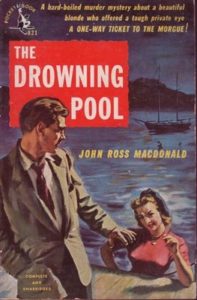
Ross Macdonald, The Drowning Pool
Only the second Lew Archer mystery, The Drowning Pool doesn’t have quite the depth of empathy and psychological insight that would come to set Macdonald apart from his noir peers, but it is a fantastically paced mystery teeming with well-drawn staples of the genre. Archer is hired by a woman who may-or-may-not-be facing a threat of blackmail over an affair that she may-or-or-may-not actually be having. Convinced to help despite her vague claims, the detective quickly learns that his client is married into a family whose home, in the hilly suburbs of LA, sits over a reservoir of oil—and that the oil company who runs the neighboring town has their sight set on acquiring that reservoir. There are so many duplicitous characters, so much institutional corruption and moral decay, that by the end of the novel you can’t help but sympathize with Archer’s sentiment that “There was nothing wrong with Southern California that a rise in the ocean level wouldn’t cure.”
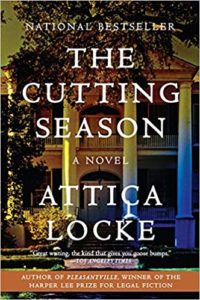
Attica Locke, The Cutting Season
Belle Vie, once a sprawling Louisiana plantation, is now a tourist attraction managed by Caren Gray, a black woman whose mother was a cook for the family who owns the estate. The staff—most of them also black—perform pageants that perpetuate the standard myths of the Old South, full of happy slaves and genteel, good-hearted masters. Yet Caren maintains a deep affection for the place—a conflict that anyone who grew up in the South will recognize as requiring the kind of mental and moral gymnastics that are routinely expected of black Americans—and it is this affection that drives her suspicion of the sugar-cane company that has been buying up land around the plantation. The narrative is set in motion when the body of a migrant worker is found in the cane fields just across the fence from Belle Vie, but it is the tension of the descendants of slaves trying to make a good life for themselves while the crimes of their history go unacknowledged that drives the novel.
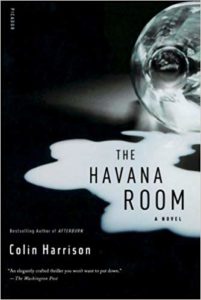
Colin Harrison, The Havana Room
Driven by a deal brokered by a desperate attorney in the titular secret backroom of a Manhattan steakhouse, The Havana Room is New York neo-noir at its whisky and cigar-tinged finest. The opening chapter sets Bill Wyeth’s fall from the top of the real estate world in motion with such brisk precision that its momentum propels you through the twists and turns of the darkly strange plot. There’s fantastic weirdness on all sides of the bargain that Bill has struck—an obsessive former baseball prodigy addicted to inhalable steroids, a music producer who uses a weaponized display of sexual potency as a form of intimidation—but the weirdest twist of all is the secret hidden inside the Havana Room itself, which is too wonderfully unexpected to spoil here.

Richard Price, Lush Life
When neighborhoods change it is tempting to blame rapacious developers or greedy politicians, but sometimes there are no easy villains, just large-scale forces of urban change and growth. But while people moving into a gentrified neighborhood, especially one that flipped as long ago as Manhattan’s Lower East Side, may have no conception of what it used to be, that doesn’t mean their ignorance is without costs. Featuring Price’s remarkable insight into the structural forces that shape individual behavior, Lush Life is the story of what happens when the two faces of a neighborhood collide, and a white hipster is murdered in a mugging-gone-wrong by a kid who lives in the tenements that tower over the bars and restaurants of the Lower East Side.
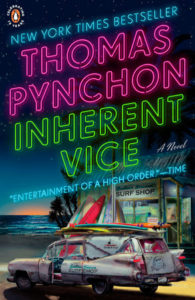
Thomas Pynchon, Inherent Vice
Pynchon’s first stab at a detective novel—or at a conventional novelistic structure of any sort—Inherent Vice shows the form to be an excellent vessel for the author’s trademark moral indignation, impatience with social convention, and his deep paranoia over who or what actually is running this show. Doc Sportello, a stoner detective in 1970’s Southern California, is hired by his ex-girlfriend to save the man she left him for, a real estate mogul who is kidnapped thanks to his current venture in Las Vegas. In true Pynchon fashion, things get very weird very quickly, and Doc finds himself deeply entrenched in a conspiracy involving corrupt dentists, a black militant motorcycle gang, fascists cops, a musician paid to fake his own death, and, looming over them all, the mysterious Golden Fang—which might be a boat, or a building, or a heroin cartel, or the teeth of a murderous animal.
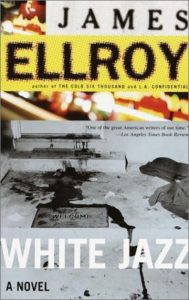
James Ellroy, White Jazz
Ellroy is a master at not only exposing the rotting insides of the institutions that make America run, but also at tracing the way that this rot infects the people who work to change them, until eventually anyone who ever thought they could stand up to power is consumed. LAPD lieutenant Dave Klein was devoured a long time ago, and by the time the novel opens he is as corrupt as they come—tossing witnesses out of windows on behalf of a crime boss, doling out bribes and beatdowns with impunity. Real estate as a lever for powerful interests is a theme that runs throughout the novel—Klein is, among other things, a slumlord—but it appears most markedly in the brutal displacement of Mexican Americans from the Chavez Ravine to make room for Dodger Stadium. Klein’s role as an enforcer in that grimy endeavor helps kick off the plot, which features Ellroy’s vintage cocktail of betrayal, violence, sex, and double-and-triple dealing by criminals and law enforcement alike.
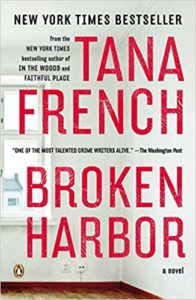
Tana French, Broken Harbor
It’s fun to imagine which current authors will one day be admitted into the canon of crime fiction. There are plenty of talented names in contention, but Irish writer Tana French is a shoe-in. Like Chandler and Ellroy and so many other greats of the genre she weaves unflinching social scrutiny into every aspect of her twisty, unpredictable plots, and has invigorated a genre—in her case the police procedural—with fresh insights and expansive possibilities. Broken Harbor begins with the murder of a family in an unfinished luxury development of the same name, and as the Dublin Murder Squad pieces together the events that led to their death the book assembles a portrait of unchecked greed and the raw exploitation of a family’s desire to live a better life. America’s sins turn out to be Ireland’s too, and no one working today is better at turning those sins into a compulsively addicting read than Tana French.

















